THE MOTHER OF ALL SPOILER WARNINGS!
The tenth episode of STAR TREK: DISCOVERY‘s second season was called “The Red Angel.” I call it the “Oh, By The Way…” episode. In my opinion, it was the weakest of the second season so far, and not even as good as some of the first season episodes.
Even the positive reviews I’ve read so far have acknowledged that this was a “talky” episode, filled with a lot of quiet scenes where two or three or four people were just chatting with each other—mainly about plot exposition. The first 37 minutes were almost entirely that, with only the final 10 minutes picking up the pace with an exciting and engaging ending.
So what is an “Oh, By The Way…” episode? Glad you asked!
OH, BY THE WAY…
After so much build-up of so many different plot elements, they were each resolved with little fanfare or impact. “Oh, by the way…the Federation has cleared Discovery, Lt. Spock, and Cmdr. Burnham of all charges.” Really? Wasn’t the whole search for Spock plotline that lasted for half the season a race because Starfleet and Section 31 were hot on his tail? Didn’t Burnham and Discovery become fugitives for disobeying orders and harboring an accused murderer? I mean, I’m glad Starfleet was willing to forgive and forget; I just wish I knew how they were convinced so quickly and easily.
“Oh, by the way, the Klingons were trying to develop time-travel to destroy humanity before we ever crawled out of the ooze.” Hmmmm, good to know! Are they still trying to do that? Did they save their research? Should we be worried? Considering that Harry Mudd himself got a hold of a time crystal pretty easily, too—and how he was able to destroy Discovery about a zillion times—the fact that those doo-dads are considered black-market trinkets scares the bejeebus out of me!
(Frankly, I prefer a timeline where the only ways to time travel are slingshotting around the sun, the Guardian of Forever, strange spatial anomalies, the Orb of Time, alien portals to 19th century San Francisco, timeships from the future, transporting through chroniton particles, a sabotaged warp drive, Q, a chrono deflector, or a red matter black hole. None of this time crystal nonsense!)
And the biggest “Oh, by the way…” was Captain Leland revealing that Michael Burnham’s parents were scientists working on a secret time travel suit and that Leland was responsible for their deaths. Now, we fans had been teased for a few episodes now about how Leland might have caused their deaths, but this seemed like the kind of thing we’d get little hints and insights about, building to the big revelation.
Instead, the mystery is solved for us in just a few pages of dialog, followed by a couple of “striking a superior officer” court-martial punches, and then it’s all Michael yelling at Tyler and then bashing a practice dummy in the gym until Spock plays brotherly therapist.
Which brings me to one of my biggest frustrations with this episode…
I STILL DON’T CARE ABOUT MOST OF THESE PEOPLE!!!
I’ve been trying to care more about the crew of the USS Discovery, and in recent weeks, I’ve warmed to them somewhat. Michael’s traumatic history and her personal frictions with Spock, Stamets’ heartbreak with Dr. Hugh, even Saru to an extent. But in the end, if the Discovery were to be crushed next week by a giant Space Kraken, the only characters I’d really miss would be Pike and maybe Spock. Everyone else…well, nice knowin’ ya! (And the one I really wanted to get to know better was blown out an airiam lock last week after her first and only decent episode.)
This despite the actors all doing very decent jobs. They are simply not being given much to work with…even when they are. Most of the actors are being handed scenes that simply have them playing one or two emotional notes, which doesn’t make for all that engaging of a song. Let me explain what I mean by that by focusing on five characters and a funeral…
THERE’S NO “FUN” IN FUNERAL
Last season, one of my main complaints was that the crew wasn’t given enough time to process all of the emotional trauma they were exposed to week in and week out: war, death, the betrayal of Captain Lorca, etc. I mean, their leader turned out to be a psychopathic murderer who tried to kill them all—and the only time we saw anyone deal with that was when Cornwell blasted a poor, perfectly innocent bowl of fortune cookies into oblivion. It wasn’t until Pike came aboard in the first episode of season two that anyone acknowledged how traumatizing that betrayal must have been. And even then, it hasn’t really been discussed or dealt with much.
It’s not that the show doesn’t take the time to deal with SOME emotional traumas. Burnham’s childhood, Culber’s resurrection, and Tyler’s un-Klingoning get the royal treatment across many episodes. But these are the notble exceptions. In most other cases, the crew magically deals with their problems and moves on. Saru’s doing fine after his quickening. Tilly hasn’t thought about her mushroom soul Mayt in weeks. And then there’s Airiam…
The funeral for their deceased crew mate was, simultaneously, too much and too little. When Dr. Hugh died, we never saw such a funeral…although there arguably wasn’t time. When Security Chief Landry died, no funeral…although she probably had no friends and the crew was less touchy-feely early in season one.
But Airiam’s funeral made up for all of that. Two hundred crew members (I counted!) got together on the hangar deck…leaving the ship on “auto-pilot” the same way they do in the navy with giant aircraft carriers. Oh, wait, they don’t. Anyway, it was a nice scene…until it wasn’t. Counting Saru’s beautiful Kelpien dirge (Saruloquy?), the entire funeral scene lasted an amazing FOUR minutes of screen time—about 10% of the entire episode!—as if to say: “Hey, Trekkies, look at how emotional we can be!” A little funeral is good, but too much is…well…too much.
And then it was all back to “normal” for everyone. Burnham and Tyler discuss Airiam in the turbolift for a combined eight words of dialog (again, I counted!), and then later, Nhan spoke to Burnham briefly in the corridor. However, the latter scene was more of a “I’m sorry for killing your friend, but it’s my job to protect the ship. However, I feel really bad now.” But aside from that, it’s another item checked: show a scene where Airiam’s friends feel bad. Check. Next scene.
I DON’T KNOW MY ASH FROM MY ELBOW!
Still sporting the most un-Starfleet haircut ever, Ash Tyler could actually be an interesting character. Think about it: he’s really a Klingon. He grew up as a Klingon. He has all of those Klingon memories. And yet, they’ve been wallpapered over with a human personality and life that he never actually lived until a year earlier. He has a child and homeworld that he will likely never see again. With nowhere else to go in the galaxy, he’s a part of Section 31, but he’s now assigned to Discovery, where he regularly has to see the man he murdered and also work with that victim’s lover.
And yet he’s so boring! He just mopes around and, in this episode, pines away for Michael for one reason and one reason only: her character needs a love interest. I mean, Saru doesn’t have a love interest. Neither does Tilly or Pike (maybe Vina) or Detmer or Owo or any of the other crew people whose names we can barely remember. Spock obviously doesn’t have a love interest. But Burnham gets one…and unfortunately, none of the writers seems to know what to do with him.
On screen, the two actors have almost zero chemistry, but that’s mostly because of the scenes they share. The two of them have three one-on-one interactions in this episode. In the first, in the turbolift, she’s cold and distant, aggrieved and judgmental of Tyler’s loyalty to Section 31. In the second scene in the corridor, she’s exploding at him in anger and scorn, again for his loyalty to Section 31…whom Burnham now knows was responsible for the death of her parents. And in the third scene in Tyler’s quarters, Burnham is suddenly sorry for her outburst (saying it wasn’t fair to him) and she’s scared…and then she’s kissing him.
Now, we viewers have seen the whole episode, but for poor Ash, all he’s seen is his sometimes girlfriend showing him the cold shoulder, coming at him out of nowhere in a furious rage, and then apologizing and kissing him. WTF, lady?
If Tyler had had something more to do with Michael’s recovery from her outburst, maybe I’d feel more of an investment in their relationship…as though Tyler were helping Burnham find her path or something. But instead, all I feel is that Tyler is a rock on that path that Burnham occasionally steps on or stumbles over.
I’ve been in relationships like that myself where I often felt like an emotional punching bag for my partner. I’m glad I’m not in those relationships anymore, and that’s why I’m not really rooting for Michash (which is the best ‘shipping one can do with their names).
EMPTY EMPRESS EMBRACING EMPATHY? EMBARRASSING!
Terran emperor-turned-agent Philippa Georgiou has two notes: wicked and nurturing…which go together like chocolate and ranch dressing. Granted, Michelle Yeoh does an excellent job playing both notes, but they don’t really work for a single character. For Michael Burnham, Georgiou can be gentle, almost loving, and empathetic to Michael’s feelings.
But then there’s cringeworthy scenes like this one…
To answer Tilly’s question, what just happened is that somebody had an idea, the writers wrote the scene, Michelle Yeoh played it as well as she could (as did the others), and no one thought to say, “Um…why is this scene necessary?”
Actually, the reason it was necessary is because the episode was nearly all exposition and set-up for the first 37 minutes. And one scene after another of characters just talking and explaining things makes for a weak, boring episode. So let’s spice it up and turn one of the “boring” scenes from exposition to SEXposition. Let’s get all playful and pansexual with the Empress.
Bad choice.
YES, MAY I HELP HUGH?
Before I start diving into the pool of Dr. Hugh Culber, can I just ask if anyone else out there finds it odd that a former clinical psychologist is one of the top admirals in Starfleet? I mean, there’s nothing wrong with psychology—I’ve got a bachelors degree in the subject, and one of my best friends is a practicing psychotherapist in downtown Los Angeles. But just as I couldn’t see him commanding military forces and determining battle strategies in war, I don’t really buy into it completely for Admiral Cornwell either.
That said, when I’m not reminded about her background, I’m not bothered by it. But this episode recalled that, “Hey, we’ve got a shrink on board! Let’s use her to fix Hugh (or at least begin the process).”
My problem isn’t that the writers included the scene of Hugh talking to the admiral. That was fine. But their entire “session” lasted only 2 minutes and 14 seconds of screen time…about HALF as long as the funeral. I’ve known people who have been in therapy for years or even decades trying to work through trauma less intense than being violently murdered and then brought back to life in a new body. Hugh has a LOT to deal with.
Not that I expected him to take up that much of the busy admiral’s valuable time (what’s she doing again?), but 134 seconds seems almost like a brush-off…and borderline malpractice for a trained psychologist. At the very least, this Starfleet medical officer is suffering emotionally. And even though the era of the ship’s counselors is quite a ways into the future, I have to believe Starfleet at least has a Sidney Friedman out there somewhere who can visit Discovery. Who’s Sidney Friedman? He’s the psychiatrist on the TV series M*A*S*H who would drop by the 4077th from time to time when there were potential psychological traumas and mental health issues. With a war having just ended, I can’t believe that Starfleet doesn’t have a few trained psycho-clinicians able to be dispatched to starships when needed.
So for me, I didn’t accept that Cornwell would simply hand Hugh two minutes of platitudes and send him on his way. If she was indeed too busy to help, at least send him to someone who can…whether the therapist comes to Discovery or Hugh goes someplace for treatment.
SPOCK FORGIVES THEE…
Over the last few episodes, I found one of the most compelling storylines to be Spock’s estrangement from his adopted sister. Granted, I found his grudge a little excessive considering the circumstances (that she was a kid and he now understands why she did it). But his snide comments, resentment, and obvious pain was—dare I say?—fascinating to watch. I was looking forward to the two of them slowly making progress toward a satisfying reconciliation.
Apparently, not so slowly! In another rushed scene, Spock now forgives Michael. Just like that. Granted, she’s hurting over the death of her parents, but he’s been hurting for 20 years. Yet suddenly Spock is doing something he hasn’t been able to do for two decades…just because Michael is hurting, too? Seems—I don’t know—less satisfying than the slow, hard-fought progress toward resolution that I was hoping for.
Like many scenes this episode, the emotion was all squeezed into a few seconds: Michael’s fury at Leland, Michael’s fury at Tyler, Michael’s catharsis with Spock, Michael’s kiss with Tyler (you seeing a pattern here?), and Hugh’s flash-therapy session with Cornwell. Checking boxes.
I’ve been waiting for this series to show more emotional development of characters…just not in fast-forward mode.
TILLYBABBLE IS STILL A THING…
And speaking of one-note characters, in case anyone was wondering: yes, Tilly can still pull off socially awkward moments…
ONE MOTHER OF A SURPRISE!
I’ve heard of helicopter parenting, but this is kinda ridiculous!
But seriously, credit where credit is due—Discovery managed to totally surprise me (and most fans) with the identity of the Red Angel. I mean, I knew it wasn’t going to be Michael, despite all the efforts of the writers and producers to make us think that from the end of the teaser. Such a shocker is never revealed at the beginning of the episode; it almost always comes at the end. And of course, many fans had already theorized that the Red Angel was Michael. Fan predictions proved way too easy with the “surprise” identity of Lorca. I suspected the writers wouldn’t make the same mistake again.
Of course, my personal theory now seems to be down the toilet: that the Red Angel is really the Discovery from the distant future. I’m still not ready to completely give up that idea, but it’s looking like they did manage to snooker me, too. And good for them!
Granted, they helped themselves by revealing at the last minute that Michael’s parents were trying to develop time travel. But that’s okay as long as it comes reasonably early in the same episode. Had there been no foreshadowing, then I would have cried foul. But all is fair in love and sci-fi…as long as you follow the writing “rules.”
SETTING THE TABLE
This wasn’t necessarily what I would call a “bad” episode. It was just a slow, plodding episode…until it reached the final 10 minutes when it suddenly transformed in one of Discovery‘s more exciting sequences. And even if we all knew that the plan was going to work (crazy plans always do when they involve the hero almost dying), the writers and director still managed to pull off the suspenseful climax.
And I don’t really blame the writers for the weakness of this episode, nor do I necessarily blame the director. This was, quite obviously (at least to me), the episode no one wanted to write. It was “setting the table” for the final four episodes which, we can safely assume, will all move at warp speed toward an exciting conclusion. But before they could do that, the plates and utensils all had to be laid out, old story elements established, and new variables explained. In other words: lots of talking and little of much else. In serialized television, this is the kind of episode that gets handed off to the low men or women on the totem pole.
The writers of “The Red Angel” have both been on staff since the beginning in humble positions. Chris Silvestri was a writer’s assistant and Anthony Maranville was a researcher. Both are relatively young (28 and 36, respectively), with short resumes in Hollywood (Chris’ earliest credit on IMDb is 2013). In other words, these guys were both good little team players, doing their jobs well, and they were rewarded with their first full writing credit for the show. The only catch: it was an episode that was 75% exposition.
As for the director, Hanelle M. Culpepper is an established veteran (you don’t pair up rookie writers with a noob director), with over four dozen episodes from dozens of popular TV series under her directorial belt. In fact, she also directed the twelfth episode of Discovery‘s first season and will be directing the first two pilot episodes of the new Picard series. And thank goodness, she’s not a big fan of lens flares!!!
Anyway, in a season of nearly all really strong episodes so far, I can overlook a single weak one. And now that the table is set and the main course can at last be served, let’s see if the final four (it is March Madness, folks!) return to greatness over the coming weeks.

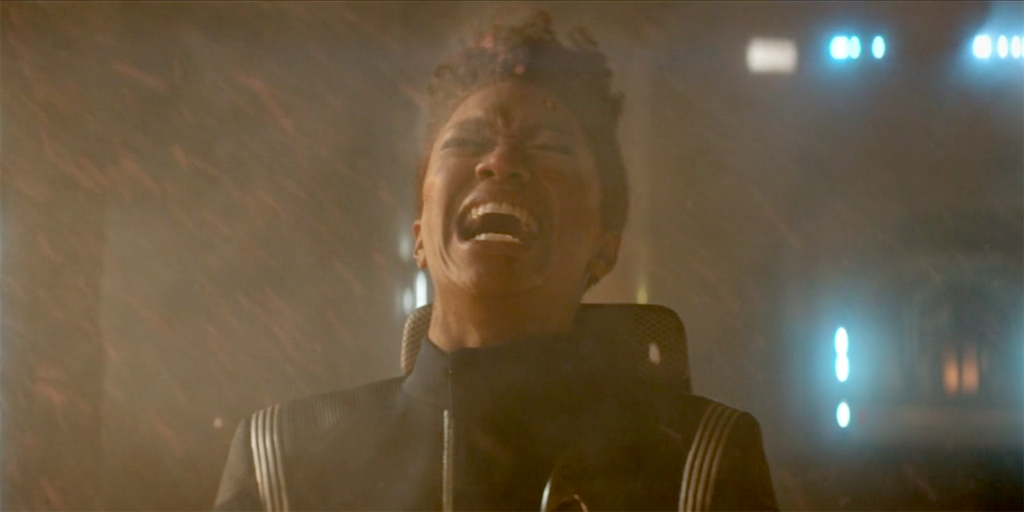
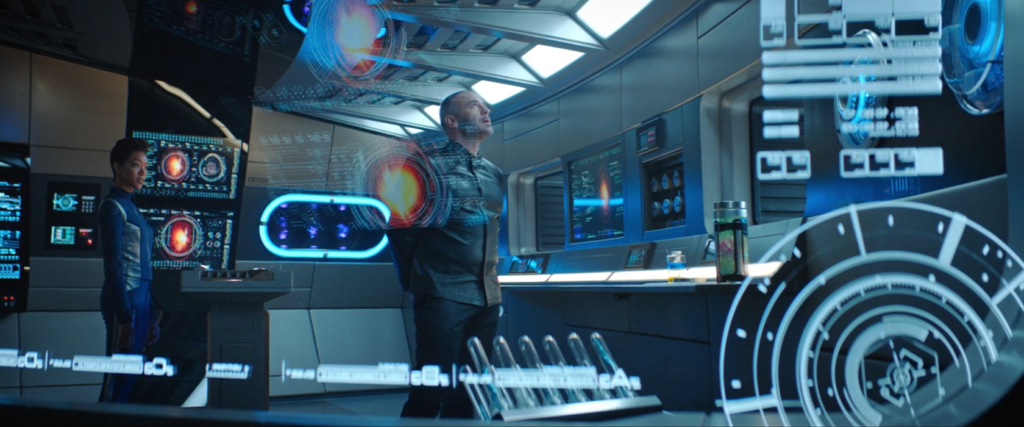
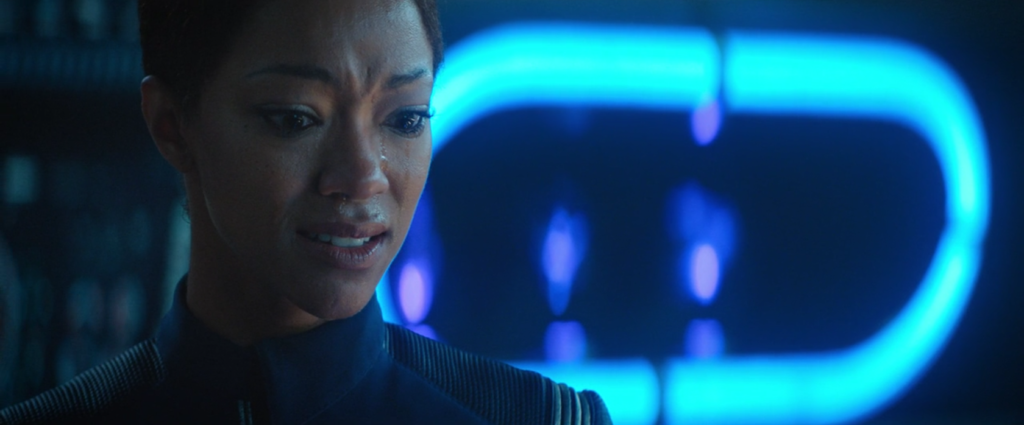
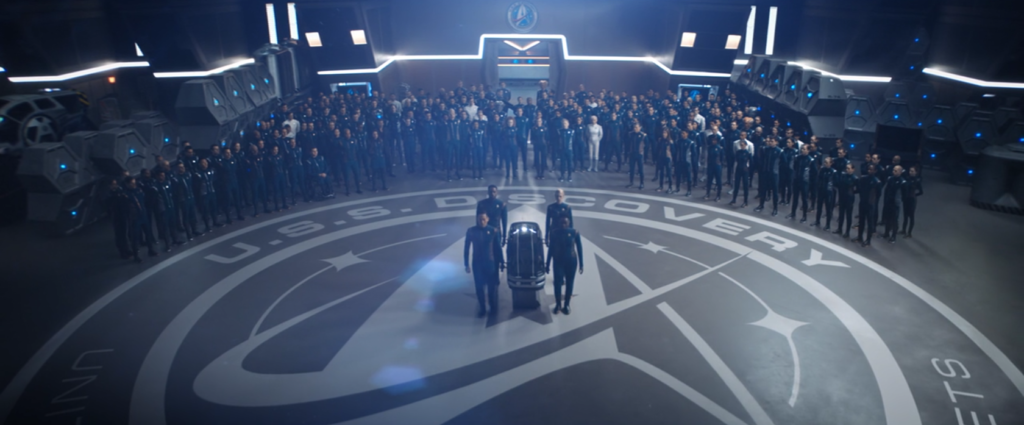
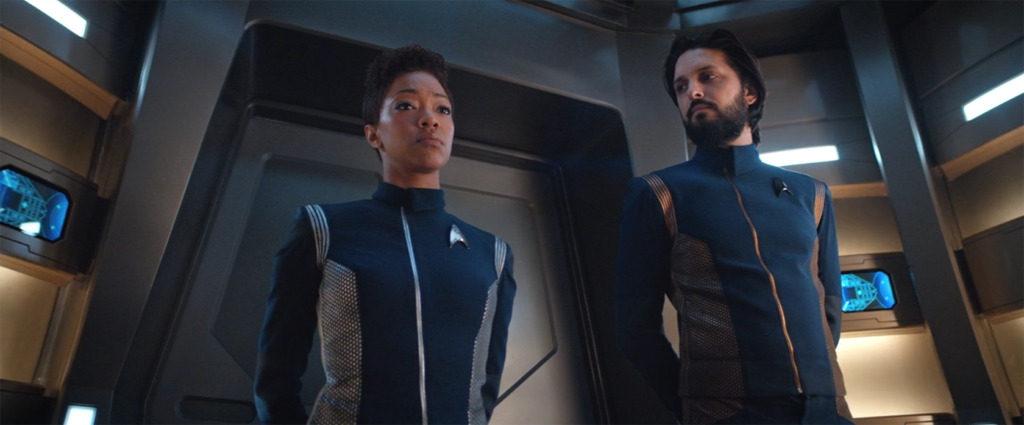
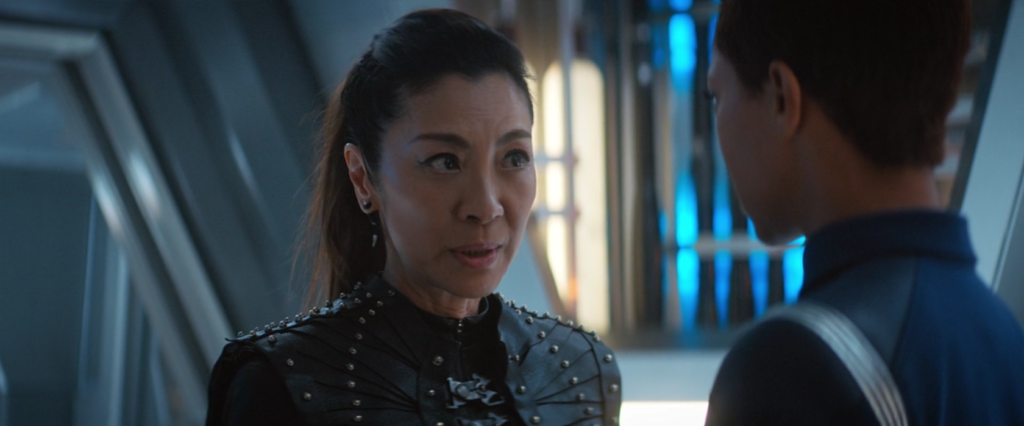
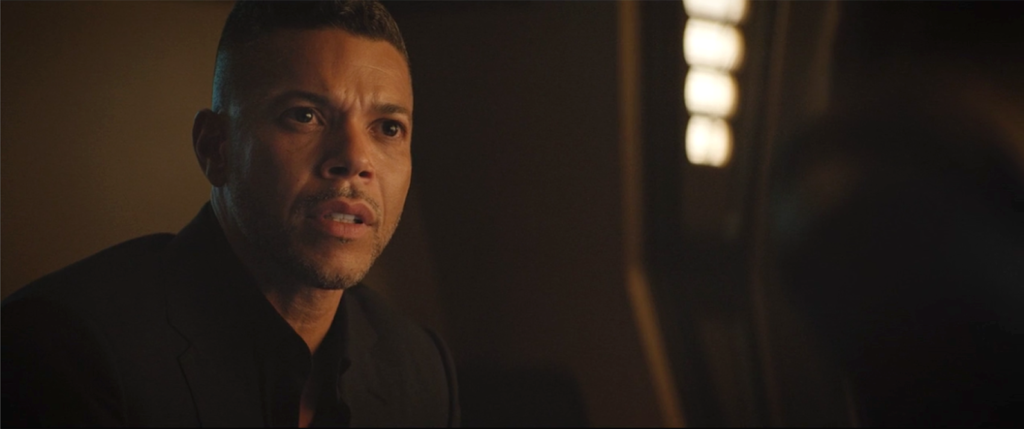
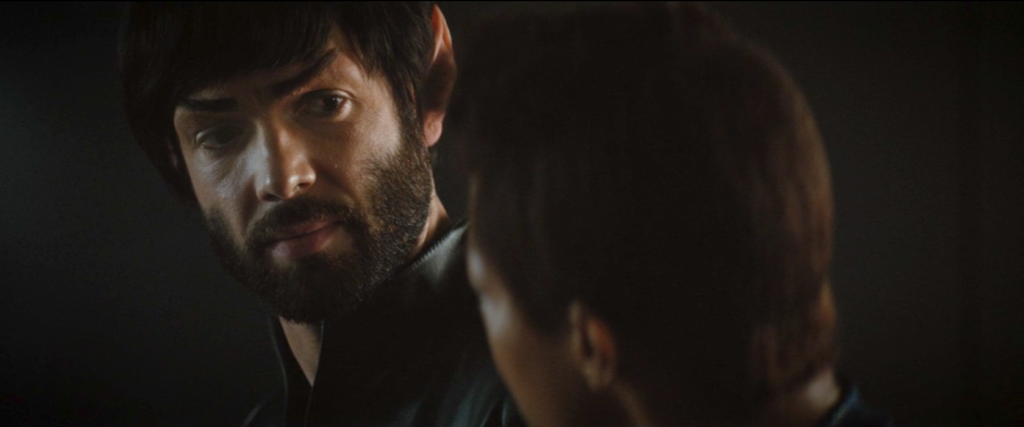
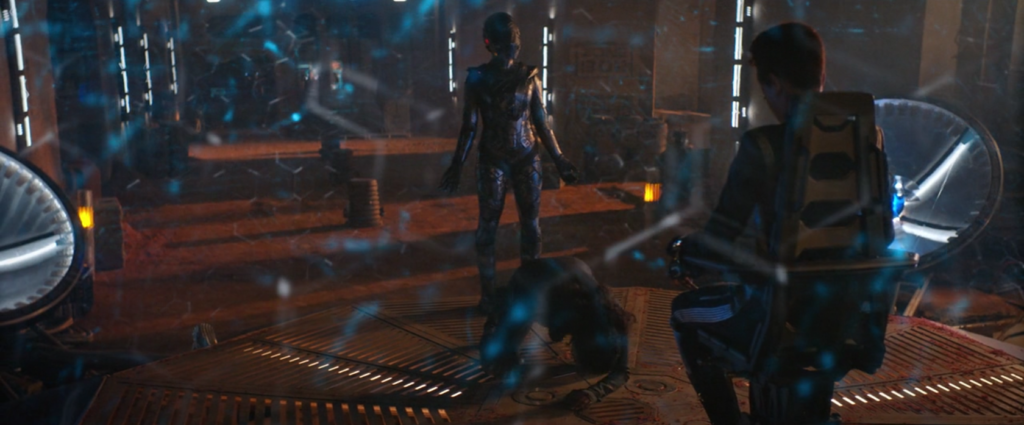
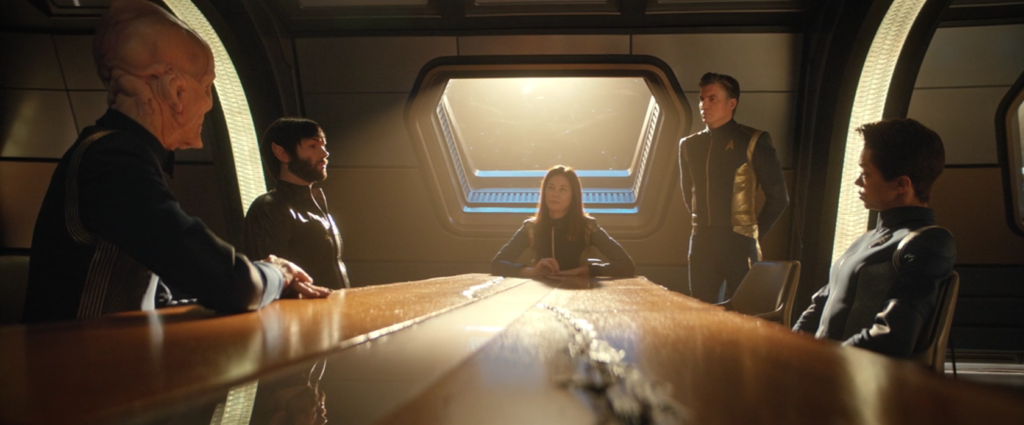
“And thank goodness, she’s not a big fan of lens flares!!!”
But she is a fan of backlit dust.
If given a choice between the two, I’ll take the dust any day! 🙂
Well I agree with all you said until the final paragraph season two has had 2 very good episodes one decent one and the rest have been as boring and predictable as season one. I was surprised that The red Angel was Mikey Spocks mum but hardy fair when it had been established for a season and a half that she was dead I am not even sure that her field of scientific expertise was shown so I would not class it as clever writing it may as well of been some stranger in fact is was.
This episode has proven that even with a new showrunner and new writers that they cannot make it interesting exciting or Star Trek with 4 episodes to go on season one I almost gave up on it and was kind of glad I didnt I have now reached a similar point. With the mooted departure of Anson Mount at the end of the series I cannot see any hope for it.
The studio should send Captain Pike, Hipster Spock and Saru back to the Enterprise and send them off on a five year mission which as we know will be cut short by Captain Pikes terrible injuries, add in Number one of course find out what happened to the chief engineer of the Discovery she has obviously been busy keeping the ship going as I haven’t seen her in any episodes since she joined the ship. In the meantime Promote Tilley to Captain who will promptly drive the Discovery into a star as she rattles on rather than say avoid crashing into that star and cancel the show in favour of a show centered about Enterprise.
I’d very much like to see a Star Trek: Pike series, perhaps with a non-serialized format more similar to TOS. Pike, Spock, Number One, Dr. Boyce, Nhan, maybe a few other interesting folks. Saru is not necessary; he’s a staple of Discovery. As for duration of the series, we know that Pike handed command over to Kirk, and Kirk won’t get the NCC-1701 for another nine years. That’s a lot of seasons until Pike has his accident.
What would be really cool would be to have the last episode of the series show Pike’s accident, and maybe having Culber and Stamets assigned to saving him (or as much of him as they can). Stamets can build the chair and Culber can try to get the impulses out of the brain. I can see the drama as they debate whether to just let him die or keep him alive in this vegetative state. Perhaps Culber and Stamets see the chair as only the first step in Pike’s recovery, and they’re working on more improvements when Spock kidnaps him.
Just thinkin’…
Spoilers Jonathan? Hardly, you left out the biggest one, who the Red Angel really vas!(checkov stop it)
Not your best review, but then it was a horrible episode to write about, so you’re forgiven. But,vi did learn some interesting tidbits, so thanks.
As for Burnham, typical woman behavior these days. Hystronic, & Narcissistic. It’s a rare find, one who is balanced. But, Burnham is the center of her universe after all. I wonder if it’s mostly men writing her script?
Also, this is the third review that hated, or strongly disliked, even from ardent fans. You know it’s bad when reviewers laugh or chuckle at how stupid some things were.
” typical woman behavior these days. Hystronic, & Narcissistic. It’s a rare find, one who is balanced. ”
What an awful thing to say, David!
Some of the most balanced and put-together people I know are women…starting with my wife, Wendy. She’s about the least narcissistic person I know, always thinking of others before herself. For example, she’s an overworked lawyer who takes the time each holiday season to bake (not just buy) cookies for the secretarial staff (dozens of people) because she appreciates how hard they work and how important they are. My wife never gets hysterical…despite facing opposing counsel all day long who buffet her with aggressiveness and belittle her with condescension. Truly, I admire how much she’s able to hold it all together day after exhausting day. And all of this while being a wonderful mother of an 8-year-old who never get hysterical no matter what trouble her little boy gets into.
But the women in my life aren’t limited to just my wife. My mother, mother-in-law, sisters-in-law, Jayden’s godmothers, other moms in Jayden’s class, friends, professional acquaintances…of all the folks I just listed (dozens and dozens), only one matches your description of histrionic and narcissistic. In fact, I know way more men (most of them on Facebook in the Axamonitor group) who check the boxes of histrionic and narcissistic and unbalanced than I do women. But I also know more men in general, by virtue of me being a Trekkie (we skew male).
Anyway, I think you owe half the people on this planet an apology for your comment, David.
I was watching this Vlog about Discovery which made a very interesting point in that writers cannot write a believable woman character. Not because they lack the ability or the skill but because they have to push the SJW Equality Diversity Agenda.
Therefore a female character has to be better than the men around her and have no faults. Now no person in the world is this even Mother Teresa of Calcutta had her faults. Add to this then surround the female character with flawed weak men to make her look even better and to justify her always being correct and it becomes simply unbelievable.
Flaws are what makes characters interesting Peter Parker didn’t help capture a criminal and his Uncle Ben Dies, Thor was unworthy of his Hammer and got kicked out of Asgard, Tony Stark was more interested in making money and showing off than being a good person. Captain Kirk was often more interested in a pretty girl than the mission in hand, Spock had his battles between his human and Vulcan side.
So now writers have wrote themselves into a corner they cannot portray women as anything less than perfect OK you can write one with idiosyncrasies such as Tilleys annoy habits, such as breathing but she will always come up with the right answer.
So audiancies do not see themselves reflected in the character they do not identify with her and lose any connection or just dont care about her. No one male or female, unless they suffer from megalomania knows they correct all the time. This is not just STD but other franchises such as SW and Doctor Who. Marvel who didn’t dare let Captain Marvel fail have boxed themselves into a corner as BL portrayal was so unsympathetic if not Boring that after Endgame they will have no public face of the MCU universe. The third week drop off has been so sharp that even with the massive amount of money they spent on marketing(Rumored to be much higher than the $170 million production cost) investors will see only a small profit on money.
We identify with Hipster Spock because of his less assured manner and doubts, we identify with Captain Pike even though the writers definitely give him a smaller role because he is a man of action but has his doubts, Saru obviously. But how many people of either sex identify with Mickey Spock she has a harrowing backstory but is on screen always being right always telling the Captain what to do even when she was boning a Klingon that didn’t slow her down and since we don’t identify with her the fact her boyfriend was a murderous spy we don’t care because we don’t care about her.
There was a lot to unpack there, Glenn–and my apologies for the delay in approving and responding to your comment. My family and I are away for the week for my son’s spring break, and my blogger time is limited.
Now, as for Burnham, if you read my review of the eleventh episode, my feeling isn’t that she doesn’t have flaws. Michael Burnham is severely flawed…sometimes. Other times, she’s perfect. The writers throw a little bit of everything into her character: strong, weak, cold, hot-tempered, confident, uncertain, serious, funny, etc. In other words, she’s every woman in the world (to me, at least). But that includes flaws. She can’t get over the deaths of her parents, and she takes the blame of the world onto her shoulders. Everything is Michael Burnham’s fault…except when it isn’t, that is.
I don’t think that TV writers today can’t write a believable woman. I’ve seen many shows where the women have flaws, uncertainties, and complexities…and they aren’t always poster-children for the SJW diversity agenda. One of my favorite shows right now, “This is Us,” presents a wide diversity of women, with all sorts of faults and strengths and ways of dealing with adversity in their lives. Other shows I love include the DC superhero series, with all variety of women characters. Yes, they’re mainly strong women (although not always), but most of the men on these shows are also strong. TV simply leans towards presenting strong characters. But there doesn’t seem to be an “Equality Diversity Agenda.” Felicity Smoak is white. Iris West is black. Sarah Lance is a white bisexual. One of Jefferson Pierce’s daughters is a black lesbian while the other is a black heterosexual. Supergirl is white and straight but her sister Alex is white and gay. There’s a character on Legends of the DC Universe who is a heterosexual Muslim woman and another who is a black woman from 1942 (who is now a shape-shifting demon). The director of the Time Bureau is a white lesbian. Add in the male characters, and you get more black and gay characters, Latino and straight characters, British and bisexual characters, and just your average white guys. Yes, there’s diversity—nothing wrong with that!—but the characters represent a vast swath of our own society.
Personally, I feel like we’re in a golden age of television at the moment…with too much excellent and above-excellent writing and directing and acting to ever keep up! My DVR is 55% full with stuff I and my wife haven’t had a chance to watch yet. And while I don’t consider Discovery to be “golden,” I’d definitely put it somewhere between bronze and silver. It doesn’t suck, and it’s not horribly written. But there is a lot of stuff on TV right now that’s much better…and much worse!
Glad I’m not the only one who was majorly disappointed with this. Much of the episode appeared to be a throwback to the worst of season 1 – angry Burnham, preachy Burnham, tender Burnham, then angry-angry-angry Burnham – occasionally interrupted by Irritating Tilly and Super-Irritating Tilly.
It seemed as if the writers were returning to the latter-day Doctor Who Method of making up any old rubbish and calling it a plot (time crystals, anyone? Mom?), in addition to playing very fast and loose with Spock’s character.
Like much of season one, reaction to this episode has been quite mixed. Some love it; some hated it. As a contrast, nearly all episodes of season two have seen a majority of reactions mainly in the positive spectrum. Sure, there’s still some negative reviews of even the best of season two. But in general, reactions weren’t nearly as mixed as for this latest episode.
Take from that what you will.
I agree with you. This was a weaker episode in a season where almost all the episodes were very good to excellent. To me it looked like the writers started out with a beginning, middle and an ending and tried to fill in the gaps. It wasn’t that it was a bad episode it just wasn’t on par with the rest of the season. However anyone that tells me that they knew who the Red Angel was is either lying or made a lucky guess. I am also convinced that Mom is not the only Red Angel.
In a way, aren’t we ALL the Red Angel?
Well, no. That would mean we’d all have a fancy time suit. 🙂
I have to agree. The time travel episodes (like the alternate universe ones) are getting too common and too easy. Though I think there is a whole new viewership, and they are as fascinated with those concepts as the people who, in the seventies, watched reruns of TOS at five o’clock every evening.
I think they should use their amazing writing team to come up with some new ideas.
I’m fine with time travel stories every so often. Heck, Doctor Who is all time travel, all the, um, time. But the problem is that Discovery has gone to the time travel well twice in less than 25 episodes. The first time was Mudd doing the time warp again…and again…and again…and again…and again. Now it’s the Red Angel (a.k.a. “Mom”). That kinda needs to be it. After season two is over, enough time travel.
They really missed a “Prime” timeline crossover opportunity. They could have tied into Enterprise & crewman Daniels, or half s dozen others that have been mentioned. That’s perhaps the biggest disappointment.
What? Vina and the Talosians weren’t enough for you??? 🙂
Ok, I apologise to the one who are balanced, but the vast majority of women are on some kind of antidepressants, or take some kind of antianxiety meds. Can you explain that? Based on tons of surveys and studies BTW. Granted, men can behave badly too, just not in the same kinds of numbers.
Of all the women I am closest to in my life, only one takes an antidepressant, and that is because her brain does not secrete enough serotonin. That’s an hereditary metabolic disorder, and if I remember correctly, her father also has an anxiety disorder and takes a medication daily to prevent panic attacks. In the same way, my thyroid gland does not secrete enough thyroxin, so I have to supplement the hormone with a medication. I inherited the condition from my mother, who also takes medication for it.
Are you concerned about all metabolic disorders, David, or only those affecting the central nervous system?
Look, David, considering that the “vast majority” of women in the world don’t even have access to prenatal vitamins or proper nutrition, I find it hard to believe that the “vast majority of women are on some kind of antidepressants.” That seems like junk science to me. And “tons of surveys and studies” is a meaningless claim. You could be lying to me. If you have peer-reviewed research papers you’d like to share, I’m happy to check them out. I was a psychology major, after all. But if it’s simply some silly Internet survey you found online (those are self-selected, often skewed, and unreliable) or a single “study” done years ago with a small sample set, then there’s certainly not “tons” of anything.
Do some homework, David, collect the research, and let’s see if your prejudices and misogyny really are supported by an overwhelming baseline of objective investigation.
Not for time travel crossover. Talosians was a nice cannon nod. Too few and far inbetween though. Every episode should have them littered throughout. But “time crystals”? “Spores” where the heck did the science go? Disco is like some “New Age” “Sychodrama”
To be fair, traveling faster than light is also impossible, as is near instantaneous communication across hundreds of light-years, creating matter from energy, and a host of other Star Trek tropes. We accept them because they seem science-y, but they are as impossible in this physical universe as a spore network or time crystals.
My problem isn’t so much the “magic” aspect of the two technologies as their logical ramifications. Conceivably, Starfleet could build maybe more Discoveries, make many more Stamets-like DNA-infused navigators, and pretty much go anywhere in the universe. Voyager could have been rescued in the blink of an eye. As for time-crystals, if Harry Mudd could get one, then they’re not exactly heavily guarded. Even one time crystal could become the greatest weapon of mass destruction ever. These ideas weren’t necessarily inherently bad, they just weren’t carefully considered and thought through.
Yes, the episode does rather hinge on being able to surprise someone who knows what you’re going to do before you do! 🙂
I have to say I didn’t find the episode too bad. With disbelief suspended it was watchable, if only par.
I do agree with you about lack of character engagement. Did you notice how at the funeral they fired out a number of fabricated character incidents that would have been great if they’d been worked into the earlier episodes?
Yep. It was almost like a “Previously on Star Trek: Discovery…” (or what they imagined it to be). 🙂
Since this rabbit trail has gone off topic, feel free to remove all related posts.
My main point, initially, was that Burnham’s behavior was typical of modern women in today’s society. Acting, or role-playing is a symptom of narcissism. Hystronic is the over the top anger Burnham exhibits many times. The writers are reflecting what they know of how many women are, or behave in today’s society.
As for studies, & articles on the use of meds mentioned above, here are jut a few quick examples. The key point being, the use of said drugs has doubled, and women take them more than twice as much as men.
https://www.health.harvard.edu/blog/astounding-increase-in-antidepressant-use-by-americans-201110203624
https://psychcentral.com/news/2011/10/25/antidepressant-use-up-400-percent-in-us/30677.html
And this because you lean liberal:
https://www.huffingtonpost.com/2011/11/16/women-and-prescription-drug-use_n_1098023.html
I may not have a degree like you, but I have first hand experience dealing with someone afflicted by the issues talked about. Actually, more like BPD, OCD, NPD, &HPD. As you must know, they have or share many of the same traits.
I checked all three of those links, and nowhere does it say “a vast majority of women are on some kind of antidepressants, or take some kind of antianxiety meds.” At best, in certain age ranges (40s and 50s), it reaches 23%. That is far from a “vast majority” and is, in fact, a medium minority. In other age groups, the percentage of women drops to an even smaller minority.
I also noticed the articles mentioned the “eye-catching” statistic that women were two-and-a-half times more likely to use anti-depressants than men. What it leaves out is that the reason often has to do with hormones related to pregnancy, post-partum depression, and menopause:
https://www.mayoclinic.org/diseases-conditions/depression/in-depth/depression/art-20047725
That’s why the percentage of women on anti-depressant medication spikes in the age group of 40-50, which is typically when pre-menopause and menopause occurs.
So with these considerations, women would naturally be prescribed medications more often than men, whose hormonal levels aren’t disrupted by metabolic life events nearly as often as women.
I’ve had experience with several women who suffered from either depression or bi-polar disorder (or sleep disorder for a friend I spoke with earlier today). I’ve also known many, many women who were not on meds and didn’t need them. In no way would I say there was a “vast majority” of women of one type or the other. Your “first-hand experience” might be unduly influencing your perceptions and incorrect conclusions in this matter, David.
In the UK the use of AntiDepressants have doubled probably as a result of government policies which have seen wages go down in real terms and costs go up in fact another 200,000 children have just been classed as in poverty. Also major cuts to NHS budgets especially Mental services. In short life is getting tougher, the majority of the people classed as in poverty are also in work! Not really on topic but in keeping with where this thread is going. In fact it might account for a lot of STD problems at a time where people need escapism, entertainment something to keep their mind off their troubles, in Short what Star Trek did best we are instead served up some preach gospel according to how we should actually think.
Every show either reflects its time or else tries to show a rosier or more optimistic escape from the realities of the current time. The 1960s of TOS were also turbulent and unsure. TOS provided a hopeful escape from that. In the 1990s, the world in general was a little less oppressive (remember the Clinton economy and the tech and dot-com booms around the world?), and so DS9 was able to show a “darker” Star Trek because the world didn’t necessarily need the cheering up of series past.
As for the UK right now, I can’t speak to your current problems. But like the U.S., things ebb and flow. Britain of the Industrial Revolution with children in work houses, the boom-to-bust collapse immediately following WWI, the bombings of London during WWII, and even the year of 20% inflation under Margaret Thatcher in the early 1980s…things get worse and then they get better and then they get worse again. Shite happens, mate. We’ll all get through this, with luck, and look back at the Trump and May/Brexit years as just another bad memory. I hope! 🙂